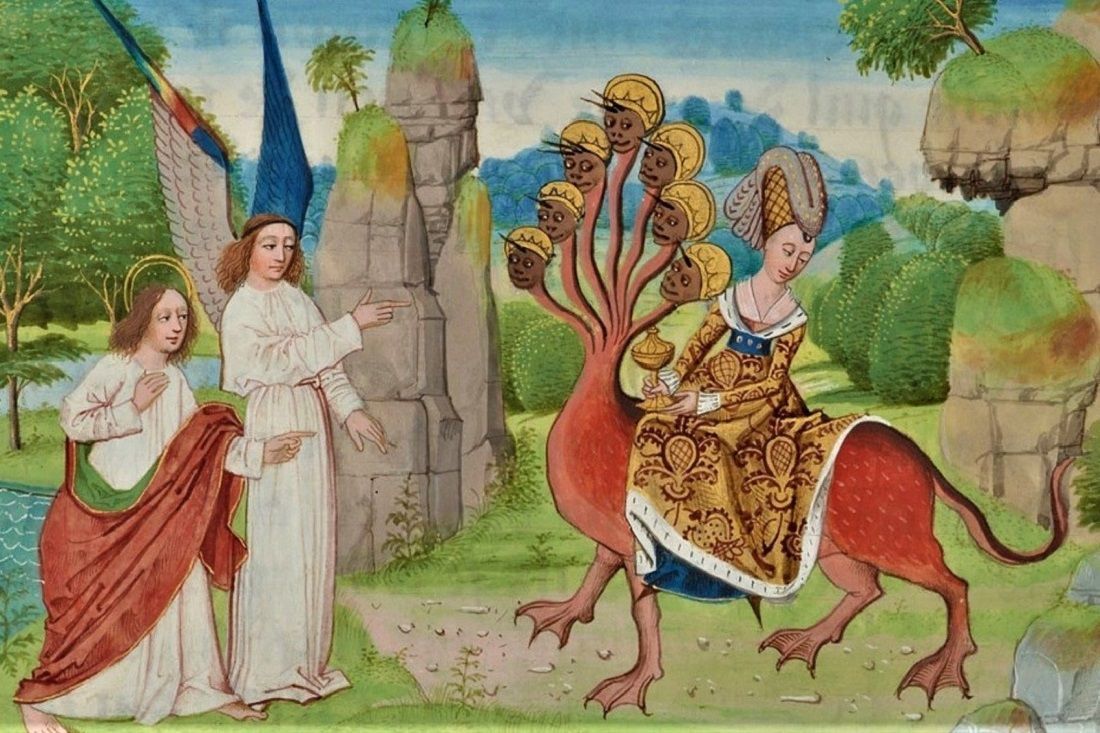You (=Jerusalem) committed fornication because of your renown, and you lavished your fornication on every passer-by.
—Ezekiel 16:15
We should realize that everything said about Jerusalem applies to . . . the Church.
—Origen, Homilies on Ezekiel
Origen is speaking of the members of the church. . . The more “ecclesiastical” they are, the more he has them in mind. Above all, he is thinking of those who are the Church’s official leaders and preachers. He spares them as little as the prophet spares the whore Jerusalem.
—Hans Urs von Balthasar, “Casta Meretrix”
As the current wave of the clerical abuse crisis began to rush over us, I could not help but think of Hans Urs von Balthasar’s essay “Casta Meretrix [The Chaste Whore].” He opens that essay with Luther’s fiery denunciation of the Roman Church as the whore of Babylon. But then, in a surprising turn, he shows that such an identification preceded Luther by over a millennium. For nearly a hundred pages, he lays out text after text from dozens upon dozens of patristic and medieval authors documenting all forms of corruption within the church. Vitriolic criticism was not unique to this disgruntled pastor from Wittenberg; it lies deep within the Catholic theological tradition.
The question, however, is what to make of all this. On this score, von Balthasar is disappointing for he confesses at the beginning of his disturbing tour of the tradition that his is “a purely historical undertaking;” theologians will need to “draw their own conclusions.” I do not have the talent to address fully the theological implications; I will limit myself to their biblical character. It may be of some solace to a laity in despair to know that the horrors we are presently witnessing have precedents in the biblical record.
A few years ago, while preparing a parish Bible study, I turned to Raymond Brown’s delightful volume, A Coming Christ in Advent. He begins with the very first words of the first chapter of Matthew: “The story of the origin of Jesus Christ.” The subsequent seventeen verses consist of a genealogy that divides into three units: first, the patriarchs from Abraham up to Jesse, second, the well-known Kings of Judah beginning with David up to the Babylonian exile, and finally, the lesser- and even unknown-kings leading up the birth of Jesus.
With respect to the first set of individuals, the patriarchs, God’s choices cannot always be explained on the basis of their moral character. The list includes both saints and sinners. What this lack of discrimination reveals, Brown observes, is “a God who is not controlled by human merit but manifests his own unpredictable graciousness.” Such a theology is fitting for “the story of the origin of Jesus Christ” because it anticipates the character of Jesus himself, a man who “preached salvation to tax collectors and sinners and proclaimed that they need a physician and not those who are already religious, and who ultimately died for us “while we were still sinners” (Rom 5:8). On the subject of divine grace, the Old and New Testaments speak with a single voice. One can readily understand why Ulrich Zwingli, the sixteenth century Swiss Reformer, had such a deep appreciation for Matthew’s genealogy.
The second list of figures—the kings of Judah who descend from David—provide a similar picture. Only a precious few of these figures were faithful to the standards of their office. The rest “were an odd assortment of idolaters, murderers, incompetents, power-seekers, and harem wastrels.” Though one could once again point to the principle of grace over merit, that does not fully capture what is unique to this particular list. For when we reach the figure of David, we enter a new chapter in biblical history. God granted David and his offspring an eternal promise:
The Lord reveals to you that he will establish a house for you. And when your time comes and you rest with your ancestors, I will raise up your heir after you, sprung from your loins, and I will make his kingdom firm . . . I will be a father to him, and he shall be a son to me. And if he does wrong, I will correct him with the rod of men and with human chastisements. But I will not withdraw my favor from him as I withdrew it from your predecessor Saul, whom I removed from your presence. Your house and your kingdom shall endure forever before me; your throne shall stand firm forever (2 Sam 7).
This promise had remarkable consequences. Though the history of the Northern Kingdom (which separated from Judah after the death of Solomon) was subject to considerable unrest among the various contenders for the royal office (for God had given them no such promise), the kingdom of Judah was ruled by just one family. The perdurance of David’s lineage in the face of the human sin and rebellion cannot be judged as anything less than a miracle. How else do we understand the radical disparity in the history of the Northern and Southern Kingdoms of Israel? Had God not made an eternal promise to the line of David, they too would have gone the way of all flesh.
The reader of the book of Kings cannot but be surprised at the way in which the throne of David was occupied by persons unworthy of that honor. But equally one cannot avoid the feeling of surprise that through it all, God remained true to his promises. Brown brings his initial discussion to a close by suggesting that list of monarchical figures might be more readily appreciated by Catholic readers than by Protestants such as Zwingli. For with the house of David we are not dealing with a set of individuals beset by various weaknesses that God, in his grace, has chosen to overlook. Rather we are talking about an institution—indeed a hierarchy (literally, a sacred order) that God has remained faithful to in spite of its unworthy office holders.
These observations about the character of the Davidic line are not without value for our current crisis. For the genealogy of Jesus is not simply of antiquarian interest—a list of ancestors from hoary antiquity from whom once Jesus descended. The story is both retrospective and prospective. It points back to the ancestors of Christ, but points forward to those who would succeed him. Indeed, it is this “ongoing aspect” that makes this genealogy “good news” for contemporary readers. The God who once chose “the scheming as well as the noble” continues to do so. Readers of the Bible have little difficulty celebrating God’s gracious designs for individual members of the church. But Matthew’s genealogy has a corporate character as well. Brown words are worth quoting in full:
The genealogy has taught us that God did not hesitate to entrust to a monarchical institution an essential role in the story of His Son’s origins—an authoritative institution (at times authoritarian) which He guaranteed with promises lest it fail but which was frequently led by corrupt, venal, stupid, and ineffective leaders, as well as sometimes by saints. He has not hesitated to entrust the sequence or the story of hierarchically structured church, guaranteed with promises, but not free from its own share of the corrupt, the venal, the stupid, and the ineffective. Those “Christians” who proclaim that they believe in and love Jesus but cannot accept the church or the institution because it is far from perfect and sometimes a scandal have not understood the beginning of the story and consequently are not willing to face the challenge of the sequence.
I have returned to these sentences several times over the past couple of months in order to make sure that my reactions to the ever-worsening revelations of clerical infidelity are calibrated to the Word of God. But let us be clear: this insight does not erase the horror, cover the shame, nor extinguish one’s ire. The abhorrent character of these gross acts of infidelity remains. Lay persons ought to be indignant at the leadership exercised by our bishops. But it is also important to remind ourselves that what is divine about the Church is not the moral character of its office-holders but the eternal promise that God has bestowed upon it. The Church has weathered ignominy in the past that is more than equal to our present crisis and is still standing. As in the Old Testament, so in the age of the New, the question is whether God will be true to his promises to his Church, a promise he made to St. Peter himself. If Matthew’s genealogy is any indication, we have good grounds for hope.
Before closing, it might be worth mentioning an insight I learned at the feet of George Lindbeck, the renowned Protestant theologian who taught at Yale. He remarked that there is much to learn from the Bible’s declaration that the church is the “New Israel.” Most Church members are inclined to see this designation solely as an honorific—we are heirs to the promises made to Israel’s ancestors. (Though without canceling out the promise made to Israel according to the flesh.) But the other side of the equation is that we are also the heirs to the bitter critique of Israel’s prophets. This too we can learn from the genealogy in Matthew’s Gospel.
But just as significantly, Lindbeck observed that one of the watchwords of the Reformation—that the redeemed are simul justus et peccator (at the same time both a sinner and justified)—is just as true of the institutional church as it is of its individual members. And the implications he draws from this insight for the present moment are profound:
An Israel-like self-critical recognition of the possibilities of corruption and unfaithfulness of the community in which one deeply and unshakably participates is self-evidently of both intrareligious and interreligious signification . . . The potential for communal self-criticism embedded in election when this is undergirded by the sola gratia is perhaps unparalleled. It implies that Jews and Christians can be maximally critical of their own communities without disloyalty, as is abundantly illustrated by their own scriptures.
The potential for maximal criticism is fully realized in the texts that von Balthasar has brought to our attention. And I think it is worth returning to them because it is important not to presume that God’s promise to the Church and her clergy leaves her off the hook regarding misuse of her offices. As the epigram to this essay displays, Origen had no compunction when it came to naming and condemning the sins of the ecclesiastical hierarchy. Let me close with the words of a Doctor of the Church, Hildegard von Bingen, which are as relevant as they are caustic:
The state and face of the Church are in these days so wretched that it is hard to think of a text one can decently apply to her . . . While the Church here below walks among proud and depraved men, she is violated by their proud and depraved . . . doctrines and morals. And though the Church has many times suffered from wicked and depraved men, she has never been more shamefully subjected, so it seems to me, to corruption than she is today with an unbridled gang of Simoniacs assaulting her chastity to satisfy their lusts . . . We can say of the Church that her corruptors are abusing her all night so much that she is dead, i.e. close to death. Yes, in many parishes, the vital fire of the sacraments, from which they could have drawn life, has been totally extinguished, just like the fire of the altar of the Lord, which was kept alight through so many years of the Babylonian captivity, is said to have been extinguished at the time when Jason and Menelaus were buying the priesthood.
One could easily read the Old Testament and conclude that God chose the wrong nation. And the same goes for the state of the hierarchy of the Catholic Church in our day. But just as in the Old Testament there were numerous voices who rose up to name and condemn the acts of infidelity perpetrated by the kings and priests installed over them, so in our own day we need brave souls to stand up and name those sins and demand reforms that will prevent, as far as is possible, such heinous acts in the future.


